This year I had a chance to sit down with editor Anna Maruszeczko of Polish Magazine Uroda Życia. This interview was, perhaps, one of the most personal interviews that I have ever done in my 40 years in the professional beauty industry. I wanted to share this side of myself with you all, so I decided to have the full story translated in English.
She left Poland in 1969 on the wave of the anti-Jewish campaign. She could have been a victim, but she did not give up. In the US, she has been hailed “the queen of algae”; the owner of the well-known brand Repêchage.
I won a good life – says Lydia Sarfati.
When did you begin to like visiting Poland?
In 1994. It was a surprise prepared by my husband. I didn’t know where we were going. At that time LOT Polish Airlines didn’t have its own check-in, it was done through Pan Am. David showed the tickets, and the lady looked at us and said, “Welcome to Warsaw! You’re going to Warsaw!”. “Where?!” – I fell into hysterics. “Absolutely not. No, no, and no.” David got scared, he hadn’t expected such an intense reaction. I had never really spoken directly about it, it was hidden deeply within me.
But you did get on that plane…
David said to me, “If you don’t want to go there, no problem, we’ll fly to Paris, to London, anywhere. But I want to tell you that I’ve arranged a meeting with your teachers.” I thought I’d go mad! But that convinced me. And so, after 25 years, I reconciled with the past.
What were your first impressions?
Both painful and joyful. Something extraordinary! When the plane landed at the Okecie Airport, I just couldn’t recover myself. David organized everything perfectly. We had lunch at the Fukier restaurant. Later, we were invited to a wonderful evening with the producers of Schindler’s List. It was then when I met Waldek Dabrowski (at the time the Chairman of the Cinematography Committee – editor’s note). I offered to give him a facial treatment. He thought I was crazy (laughs), but we’ve been friends for 20 years now. We went to Legnica by car so that David could see a bit of the country.
What’s in Legnica?
I was born there. My aunt, who’s now 91, still lives there, the only one in our family who stayed there. It was she who arranged the meeting with my teachers back from primary school, with Mrs. Lewandowska, who infected me with mad love for literature, with Mrs. Dylewicz, who taught me biology… It was fantastic that they remembered me so well, “Oh, dear Lidia, when you were President of the Student Board, you’d come to the staffroom, take out a white starched napkin, plates, cookies, and, while they were eating, you’d just talk about your ideas. And you know what? You were the only one they never said no to!” (laughs).
I imagine that your leaving must have been a huge blow for them too.
At that time, in 1968, Legnica was a small town filled with vibrant Jewish culture. Nearly 1,000 people of Jewish origin lived there, from Poland, Ukraine, Russia. We had a community center, a theater, a school… When, in 1968, the campaign against the Jews and the departures began, Legnica completely changed as a town. Mrs. Dylewicz told me that it was a moment when both the past and the future were lost, that there came a terrible emptiness. We were all “given” a one-way ticket by the 1st Secretary of the Central Committee of the Polish United Workers’ Party, Władysław Gomułka.
How much time did you have and did you know where to go?
Already in 1967, after the war in Israel, there was a lot of quiet talk about it. And after Gomułka’s speeches, where he said that all Jews are conspiring enemies of Poland, that the Jewish minority is like a Nazi fifth column… “You have to leave by the end of 1969,” they said to us. A lot of people went to Sweden then as the Swedish government offered good conditions, but who would want to be in three meters of snow all the time? We went to Vienna, and then to Rome.
What do you remember from that time?
I remember well that my father’s friends took us to the border with Czechoslovakia because they didn’t want us to go to Warsaw. They got us to the station by cars. But when the train arrived, we weren’t allowed to get on, we were told to wait until morning for a suitcase search. My mother became hysterical, and then fainted. I screamed at her to get up, I begged her to be strong. I asked myself how much pain you can endure in one lifetime. On that cold, sleepless night, I became an adult. In the morning, they took us to some room, we had six suitcases. They opened each and every of them, took out everything, they tore, they ripped…
You packed your whole life into six suitcases and then these six suitcases were searched inside out?
It wasn’t searching, it was rummaging. All our belongings, our privacy and the pride that remained were thrown onto the floor. The militia mocked and insulted us. When we crossed the Polish border, I vowed to myself never to come back.
Why didn’t your father’s friends want you to go to Warsaw? They wanted to spare you something?
It wasn’t that… They wanted to be with us until the last moment. They were my father’s best friends, although they weren’t of Jewish origin. They missed him so much that eventually they fled Poland shortly after us. After two months, they arrived in Rome, they had the status of refugees and got visas to Canada. None of them is still alive. They were all doing well, but back in Poland, they proved to be my father’s true friends, they wanted to be with him. It was amazing.
What did your teachers feel when they learned that you have to leave Poland? Did anyone try to do something about it, or were they afraid too?
Some were afraid, but Mr. Kowalczyk, who was my history teacher, told me, “Dear Lidia, I want you to stop crying. You know what a patriot I am, but if I could, I’d leave this country right now, even if I were to leave with nothing else but this brown suit I am standing here in now. You have been given an opportunity of a lifetime. Maybe it looks scary now, but you should thank fate, take your things and leave as soon as possible.”
Did it help you in any way, calm you down?
He had taught me about the Polish power, about the nobility, kings, battles for the country, about the language. And I was shocked that he would say such a thing. This sobered me up, “If Mr. Kowalczyk says something like that?!” I did not know yet where I would end up, but decided in my heart to “close” everything behind me, not to look at it again, not to talk about it again. Not to think about the past but about the future, about what will happen tomorrow, on the day after tomorrow.
And after that, were there any situations that made you feel more confident?
I didn’t feel confident at all, but I realized that there is no other choice and I have to stay positive. I realized that I can either be a victim all the time or I can fight. I decided to be a soldier, an officer, that I would do anything to win a life and give kindness to my parents. It was important. I always – sometimes desperately – tried to be a good girl, so that my mother wouldn’t be gloomy and my dad would stop clenching his teeth. I lamented my parents’ lost youth.
How did your parents tell you that you were going, that you had to leave forever?
They didn’t really have to say anything, it was clear. You turned on the TV and heard what Mr. Gomułka said. They just kept wondering what we would do when we left, where we would live, where we want to live. We stuck firmly together. Father was always optimistic and he used to say to me, “Listen, learn English, we’ll go to America. Everything will be fine, you’ll see!” He had a vision.
I came back to Poland after 25 years. I met my friends, teachers. I reconciled with the past.
LYDIA SARFATI, New York, the end of the 70’s.
Change didn’t scare him?
No. What could scare the generation that survived the war? For them, it was important that I could have a better life. Freedom was important.
So your parents weren’t as frightened as you were, they could see the positive side?
They either didn’t want to look frightened or thought that the new opportunities are more important. At first it was hard. In Vienna, the three of us lived in one room. The same in Rome, for nine months. The bathroom and kitchen were outside, shared with other people. After the war, my parents lived quite well, my mother had a housekeeper, beautiful furniture, porcelain. And here, the same again – of course it wasn’t a camp, but a difficult life.
Exile again?
Exile without the language, none of us spoke Italian. In Rome, I saw – for the first time – my father cry. I remember when I went out from that rooming house we stayed at in Rome – dad wanted some sparkling water, he liked it very much, but I had absolutely no idea how to ask for it. I went into a store and made a face. When you don’t know how to say something in a foreign language, you’ll use your fingers, legs, and somehow “explain” what you mean (laughs).
You took only six suitcases, what did you leave back in Poland?
We left the past there. In life you know the past only. You can have as positive thoughts as possible, but you don’t know what will come. So, we left an apartment, our friends, acquaintances. Life… Mrs. l.ewandowska asked us once to write about how we imagined our future, where we saw ourselves when we were 40. “And what did I write?” I asked, already forty-something. She said, “You wrote that you would get married to a very good man, that for you it would be very important, that you would travel the world.” Virtually everything I wrote at the age of 15 came true later, even though I had forgotten about this declaration.
You designed it to happen?
I designed my life. When we were in Rome and lived in this one little room, I never felt unhappy. I’ve always been very positive – perhaps I took that after my father. I learned English, took up different jobs, went to see everything I could. 1969 in Italy was a different world. New, open, offering opportunities. Besides, there were a lot of people from Poland who were in the same situation as me, we were all close friends.
SHE OPENED HER FIRST BEAUTY SALON
Klisar Skin Care Center in 1977.
It quickly became a New York sensation.
WITH HER HUSBAND, DAVID SARFATI, 1984.
Lydia says that he reminds her of her father – he’s afraid of nothing.
WITH HER DAUGHTERS IRES AND SHIRI, 1980.
When the children were little, she could always count on David, that he’d “be there and love.”
You walked the same paths?
Yes, it was extraordinary. To this day I still have two friends from that period – Janusz from Katowice and Ludmila from Szczecin. She is a doctor in Los Angeles and Janusz is a multi-millionaire. They chose the same path, the path of success. But one of my friends committed suicide.
In that period or later?
In 1970, soon after we had left.
Was he Jewish or Polish?
Half and half. His father was Jewish.
You say that “they chose the path of success.” Do you think it is always a matter of choice?
I like to think that it is. It seems to me that we make choices every day. We get up in the morning, and it may not be the most beautiful, may not be the best, and our choice is to be either bitter or sweet. I like to be sweet. When you’re bitter, you’re doing yourself a harm, you poison yourself and other people.
But you left the country in the aura of the campaign against Jews. Did that hurt you, did you feel humiliated? Did you know how to defend yourself against this?
Actually, I never really experienced that from my Polish or Polish-Jewish community. Rather the opposite.
That you’re a victim of this system?
Yes. I never experienced from my friends anything but love. There were some incidents in high school, someone shouted, “When will you leave already?!”, “Down with the Jews”, or “Damn Jew”, but that didn’t matter because most people were very warm to us, they cried, they couldn’t really understand why. You could say that Poland was an awful place at that time, but for me it wasn’t. I remember trips to Sopot, Zakopane, holidays in Przesieka. I had a good life. I’d be lying if I said that it wasn’t so.
But you didn’t want to come back to Poland, you didn’t want to hear about it. Was it aimed at someone or something, was it trauma that you didn’t know how to handle?
In my parents’ eyes I was always a hero, I was always tough, strong. They never saw me cry. I always wore a smile, but, of course, I had a lot of pain in me, I felt betrayed. It seems to me that the first time you experience betrayal is always the worst, whether you’re betrayed by your husband, friend or homeland, it hurts the same.
Especially if someone is pure at heart, has ideals. You were on the threshold of life…
Perhaps if I had nothing, I hadn’t been anywhere, hadn’t seen anything… When you have nothing to lose, you miss nothing, but I had a lot. My friend Janusz will never come back to Poland, he doesn’t want to hear about it. I keep trying to convince him, “Come with me, you’ll see it will be OK,” but he doesn’t want to hear about it at all.
So he hasn’t really coped with it?
No. Even today, when I talk with him, I feel that there is a huge wound inside of him, just as there used to be inside of me. But I think that if he came back, it would be easier for him to live.
On the one hand, it is not surprising – his past was tragic, but to cultivate it in you is like condemning yourself to prison. There are many people who do that.
Many.
You could have been one of them, had it not been for your husband?
Yes, I know. I had all the makings. I’m very close with Janusz because I understand him, he doesn’t even have to say anything to me. We went through it all together. I wish he would go to Poland and free himself from his unhappiness.
But you did say that he was lucky in his life.
He has everything. But perhaps his deep pain is why he’s still missing something in his life, why he continues to push on and multiply his wealth.
My coming to Poland gave me the opportunity to regain my love to this country and to myself. I’m still savoring it.
Coming back to your parents and the influence they had on you.
My mother was a pessimist, it was because she had a terrible life. She was born in Russia and when the Germans entered Russia, she, her brother and her sister were caught and sent to a labor camp in Germany. They had various experiments done to them. Mother had skin transplants done on her, they were tormented. Later, after the liberation, her sister married a Polish officer, he had Polish papers made for them and so, in 1945, they arrived in Poland. Mother married almost immediately. Her first husband was an important person in the militia. It later turned out that he was a drunk, he beat her, so she divorced him.
Her mother died in childbirth and her father remarried. Her stepmother would beat them terribly, it was her who gave them over to Germans. So my mother had incredibly many wounds. After the war she went looking for her father. Everyone thought he had died. In 1958 it turned out that he was living in Kazan. We all went there together. I will never forget how her stepmother fell onto the railway platform and began to kiss my mother’s feet, asking her for forgiveness. It had been a nightmare to her, and it seems to me that it wasn’t because of the war, but because of the rejection. I’ve never been angry at my mother for her pessimism…
So, is our attitude to life always a matter of choice?
Not always. When I used to look at my mother, I couldn’t say that she wasn’t strong, but she never chose happiness, perhaps she was afraid to choose it. She was afraid to lose this happiness once again.
And your father? What’s his story?
My father was born in Rivne. W 1921 it was still Poland. In a religious Jewish family, his parents had eleven children (laughs). Father had a good life there. They had a tiny manor house, my grandfather had a variety of businesses, I don’t know exactly what kind, but they were connected with furs. Unfortunately, when the Germans came to Rivne, they took the whole family, ordered them to dig a pit and then killed all of them.
How did your father save his life?
He fell under his mother. Back then Germans wouldn’t walk around and finish off the wounded, at that time they were still stingy with bullets. He told me that he had spent 12 or maybe even 15 hours under his mother. At night he fled to the partisans.
And how did he manage to maintain his faith that a better scenario would be realized?
He chose to.
Choice again?
Yes, because whether we lived in a tiny room or in a large apartment, whether he had something to wear or had nothing to wear, for him it didn’t matter. When we came here to the United States, he was unable to learn English, he struggled with that because usually he didn’t have problems with achieving something, he could do everything. Once, he got lost on the way back from the factory where he worked. Police brought him home and it was probably the second time I saw him in a bad state.
He felt humiliated?
Yes. But next morning he said, “You know what, it’s nothing. It’s a good thing I had the address written on a piece of paper!” (laughs). I think it is a gift from God. And David is the same in his nature, or even better, because he is afraid of nothing. Nothing. Sometimes, when I start panicking, “Oh my God, what will future bring?”, my husband replies, “What are you talking about? Nobody knows what future will bring. You have to look at what is now!”
What do you think was the reason why David organized your visit in Poland?
He could see that even when I giggled, was having fun, was dancing, I still had this pain in me. I think he wanted to reduce it somehow, he wanted to treat me, and when you are to be treated, you need to go to the hospital (laughs). “Come on, let’s go there, maybe you really do have that life your teacher told you about.”
At what stage of life were you then, what was your professional situation?
In 1994, I had already had my business for 14 years. I was the owner of Repêchage, and you could say I was already something of an important person in my field, a star even.
That went fast.
But I haven’t mentioned having worked in the salon for 15 hours a day, customers who I attended to after hours in my apartment, and a few other titbits, including a deep disappointment caused by people who I had trusted (laughs).
Americans specialize in simple names. Repêchage is not one?
Repêchage means “a second chance”. It is my second chance at life, both personal and professional, but also a second chance for people who never really nurtured their skin. There’s always the possibility of change, no matter what you’ve done, what mistakes you’ve made. You can regenerate your life. You can regenerate your skin. Thanks to algae. I devoted myself to creating treatments based on algae.
When did you have that revelation?
When I was with David in Israel in 1977, we stayed in Kibbutzes, to see how people live there, and every morning when we woke up, there was a huge breakfast for everyone. I couldn’t understand how come their vegetables and fruits, for one thing, smell so beautifully, and for another, are so tasty, how come the cucumber tasted like cucumber, the orange tasted like orange. “How is that possible in this dry country?! I go outside and after five minutes I’m dying of thirst. It must be God’s doing for sure. We’d better go fast into religion” (laughs). Finally, I just couldn’t hold my curiosity back any longer, ”David, why don’t we ask how they do it?” He said, “What, you want to be a farmer?” “Not a farmer, no, but it’s really interesting.” And it turned out that they were using seaweed as a nutrient. It helped to retain water in the soil, plants and leaves.
And now these algae do the same for our skin.
Exactly. I thought to myself, “Shoot! Where do they take these algae from?” I found out who and where and what farmer… I boarded a plane and flew there.
So you’re a trendsetter when it comes to using algae in cosmetology?
I was the first one in the States.
How did you build your empire?
It was something new. Everyone was interested in it. I gave a lot of interviews – TV, New York Times, Vogue. Great, but on the other hand, I had to convince everybody, teach everybody. All the energy I put in it, all the business trips, seminars… If you asked me now how I managed to do it all, I wouldn’t be able to tell you, I really don’t know.
You keep working very hard, but in truth you could just lie around and do nothing.
I love it. I travel all the time. I wrote the book Success At Your Finger Tips on board of a plane. I want to share with others what I know about the ways to success in this industry.
How is that possible that, being as busy as you are, you didn’t lose your husband somewhere on the way?
I don’t think it’s below me to cook dinner after coming back home… I’m a Cancer, so for me the warmth of the heart, the warmth of your home is very important.
Why do some marriages fall apart when it’s the wife who is successful at work?
Because of envy perhaps. There was never any envy between us. David could be envious of me when we go somewhere on business, because everybody rushes to me, but he just stands next to me with a huge smile on his face… When David proposed, I said to him, “Look, I want to be your partner in life and work. I will never tell you to change, and I ask you not to ever tell me to do that either. If we can help each other to be better, do it of course, but I don’t want you to change you.”
FOR MANY YEARS NOW she has been running the company together with her husband. There has never been any rivalry or envy between them, although it is she who’s famous.
Sometimes I start panicking, “Oh my God, what will future bring?”
And my husband says, “What are you talking about? Nobody knows what future will bring.
You have to look at what is now!”
So how come you were so smart at the beginning of your married life?
I had seen unhappy people. In my family, in my friends’ families, I saw that women struggle in their relationships, more than men do.
There has never been any rivalry between you?
It was I who created Repêchage. David joined me in 1996. Before that he was in something else, he had shops, real estate, various restaurants, bars. He decided to sell it all. And we had to somehow get used to each other because for the previous 16 years I was “the queen of algae.” I wondered how to do it so that he would feel good and the staff would treat him on a par with me.
A very difficult diplomatic mission.
Very difficult. I decided to give him my office. I prepared a new office for myself and gave him the big one. I remember when my father come to the office once, saw what I had done and was really unhappy about it… (laughs).
The queen of algae steps aside…
And what would I have done without David? When our daughters were little, I always knew that he’d be there, that he’d love.
When did you get married?
I came to the US in 1970, met David in 1971, we got married in 1972, and in 1973 I gave birth to our first daughter (laughs).
Do you remember the day you met him?
It was on a date arranged by Helen, whom I met in an English course. I remember exactly what I was wearing – a red midi dress and black over knee-high boots from Italy. He came for me – I remember the doorbell – and we went to Helen’s for coffee. We sat in the gazebo, and David said, “I’m sorry to be staring, but my father has a shoe factory, and yet I have never seen anything like this before!” (laughter). And he kept looking at my legs and those shoes the whole evening, where they would go, “I’m really sorry, but I am fascinated by your boots…”
So that’s how it started… Thanks to Helen.
We wanted to find her. Unfortunately, we weren’t successful. And there would be a lot to thank her for.
INTERVIEW BY Anna Maruszeczko
*Note: You can find the original interview in the March 2015 issue of Uroda Życia.
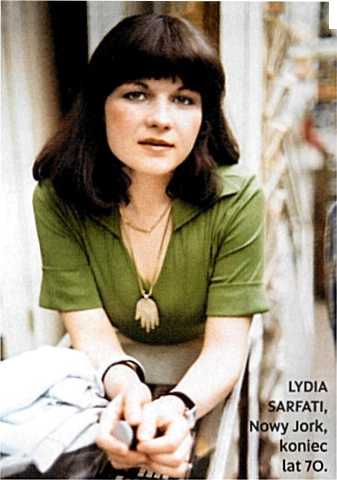
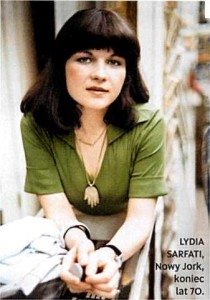
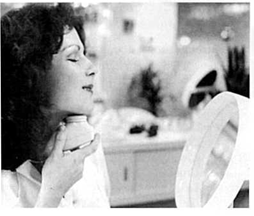
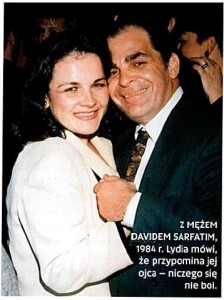
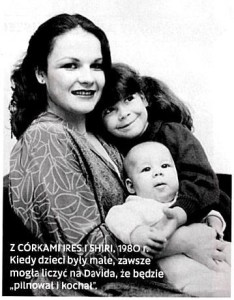
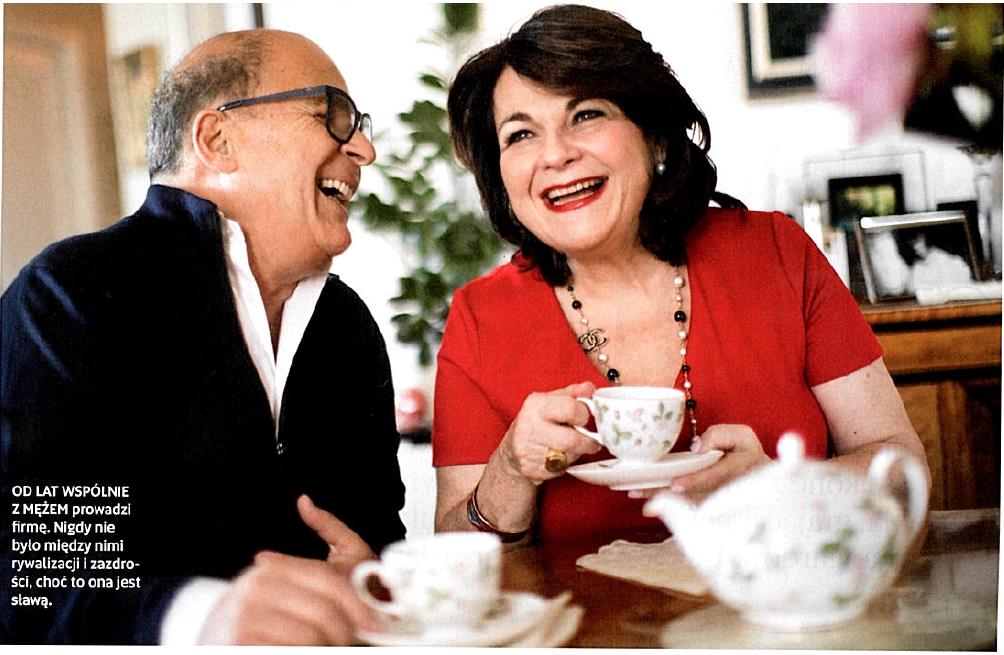
I love your story Lydia. You are such a brave, strong, energetic, intelligent woman and someone to really be admired in our industry. I thank you for sharing your past to empower other women to pioneer their own dreams. We and our clients love the four layer facial, hydrating seaweed spray, C-Serum and mineral foundation. I’ve taken CIDESCO classes you’ve instructed and read your inspiring book. Thank you for your dedication to the skincare industry and for being a leader to really admire.
Blessings to you, your family and Repechage!
Karen Shealy
Owner/Esthetician
Sea Glo Spa and Boutique
Homer, Alaska
Karen,
Thank you so much for this sweet message! I am happy to share my story and only hope to motivate other women in the industry. Your message is incredibly kind, so thank YOU for taking the time to share this with me. Please do come say hi next time you attend one of my classes.
Blessings to you as well!
xoxo, Lydia
Thank you for sharing and opening up your heart it is truly a beautiful story there is something to be said be positive, stay focused and you can truly live the American Dream
Thank you for your kind words and support Kelly!
xoxo Lydia